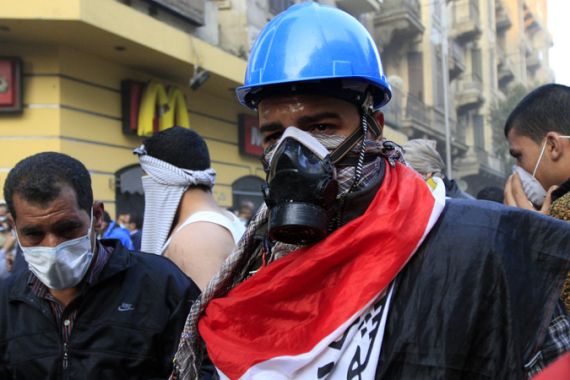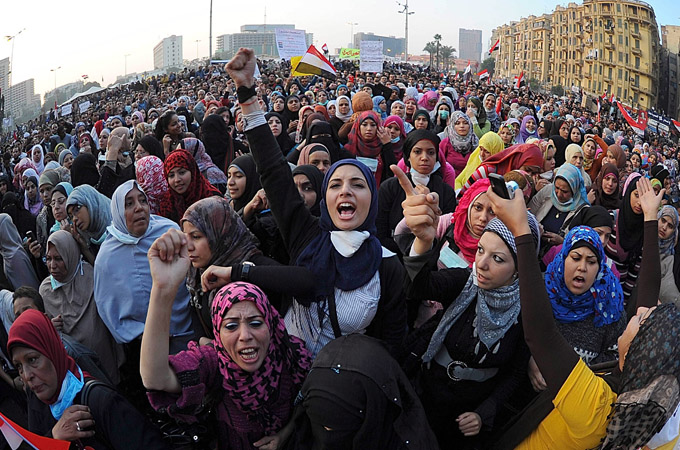Egypt’s unfinished revolution
Egypt’s military rulers are inheritors of the colonial order that the events of 1919 failed to fully overturn.

 |
| Egyptians have turned out in huge numbers in recent days to protest the military’s continued rule over the country [EPA] |
Cairo, Egypt – Since the afternoon of November 19, a steady battle has been raging up and down Mohammad Mahmoud Street at the heart of downtown Cairo. As the mounting flurry of press coverage around this newest phase of Egypt’s revolution has noted, the extraordinary events of the past few days have given Mohammad Mahmoud both strategic and symbolic significance: The street is one of the main thoroughfares leading out of the Square in the direction of the Interior Ministry. As the current regime has resorted to ever-more-brutal tactics in its efforts to quash the reoccupation of Tahrir, Mohammad Mahmoud Street has become the frontline in clashes between security forces from the Ministry and protesters fighting to hold the Square. The more the violence unleashed by security resembles or even exceeds the horrific experiences of late January, the more the Interior Ministry becomes a focal point for those who see the revolution as incomplete.
Given the extraordinary eventfulness of the present, it is hardly surprising that few, if any, commentators have thought to dwell on so banal a matter as the name of a street. But doing so begins to disclose a bitter and potentially instructive irony in the current moment. The Mohammad Mahmoud in question was one of the four members of the original wafd or “delegation” that sought to represent Egypt at the Paris Peace Conference of 1919 and thereby to argue before the international community for Egypt’s independence from British colonial rule. On March 8, 1919, in an effort to forestall any threat to their Egyptian Protectorate, British authorities arrested all four men and exiled them to Malta. The following day, groups of students began organising demonstrations in the major streets and squares of Cairo; within a week, protests against British rule had spread to Egypt’s other major cities as well as hundreds of towns and villages throughout the countryside.
From the earliest days of the January 25 uprising onwards, political analysts both in Egypt and abroad have expressed an eagerness to adduce comparative cases as lenses through which to view the present and, perhaps, glimpse the future. At various points in the last 10 months, we have heard that Egypt today could become Turkey after 1961, France after 1968, Iran after 1979, or Poland after 1989. Lost in the face of this compulsive yearning to conjure the ideal model are the possibilities both that what we are now witnessing might be genuinely new, and that Egypt’s own history might in some way help us to understand the significance of the present.
Greater attention to that history reveals that Egypt’s current military rulers are the inheritors not merely of the Mubarak regime but also of the colonial order that the events of 1919 failed to fully overturn. Throughout the long decades following the British occupation of Egypt in 1882, colonial rule rested on a rigid logic of security that rejected the very notion that Egyptians themselves might be capable of serious political thought. As a budding nationalist movement mounted its first vocal challenges to colonial occupation in the early decades of the twentieth century, the Interior Ministry became the central node in an increasingly dense network of surveillance and repression. So confident were British officials in the effectiveness of this security apparatus and the superficiality of calls for popular mobilisation that they dismissed the first protests in March 1919 as limited to a mere clique of disgruntled and unemployed youth with no better use for their time.
Unfinished business
The unprecedented movement of Egyptians all across the country that ensued from those early demonstrations quickly overwhelmed British expectations. When at last the combined forces of the occupying army and the Interior Ministry were able to quell months of strikes and protests, the British were compelled to reconsider their position towards Egypt. The eventual outcome of that process was the unilateral decision in March 1922 to grant Egypt a qualified independence. Although the country would be governed thereafter as a constitutional monarchy, the British retained the right to intervene in any matters seen to affect the security of imperial communications, the interests and safety of foreigners on Egyptian soil, the threat of foreign invasion, or the status of Egypt’s relationship with the Sudan.
These reserved points, Egypt’s first unwelcome experiment with “supra-constitutional principles”, made a farce of constitutional democracy. In the final years of Mubarak’s rule, under conditions of profoundly limited political expression, dissidents often invoked the inter-war period as a golden era of liberal efflorescence. Whatever the rhetorical force of such narratives as a contrast to the dismal conditions of the present, they rested on a mode of historical amnesia the country can no longer afford to entertain. The reserved points of British responsibility guaranteed that expressions of popular opinion at the polls would hold little weight against the dictates of British security. The outcome of this arrangement was a decades-long tug-of-war between a nascent popular democracy and a residual colonial regime that repeatedly exercised its authority to topple and replace elected governments at will. And as the voluminous files of the British Foreign Office demonstrate all too clearly, this system of outright political manipulation depended heavily on continued access to the Interior Ministry’s mechanisms of domestic espionage and organised violence.
The echoes of Egypt’s longer struggle for meaningful political determination are lost on a regime that continues to bellow its nationalist credentials as a blanket defence against its critics. In its efforts to dismiss the huge crowds that have swelled Tahrir as unemployed rascals or gullible pawns in a shadowy foreign plot, the ruling military council has shown itself to be the unwitting heir of Egypt’s colonial past. In its stubborn claims to stand beyond politics and protect Egypt’s citizens from their own decisions, it parrots the logic of a system that has, for well over a century, denied or deferred the rights of ordinary people to think and even argue for themselves. To date, the outcome of the current standoff remains far from clear. But this is the unfinished business that lies ahead on a street called Mohammad Mahmoud.
Aaron Jakes is a doctoral candidate in the departments of History and Middle Eastern and Islamic Studies at New York University. He lives in Cairo, where he is conducting research for a doctoral dissertation on the agrarian history of British colonial rule in Egypt.
Follow Aaron Jakes on Twitter @aaronjakes.
The views expressed in this article are the author’s own and do not necessarily represent Al Jazeera’s editorial policy.
